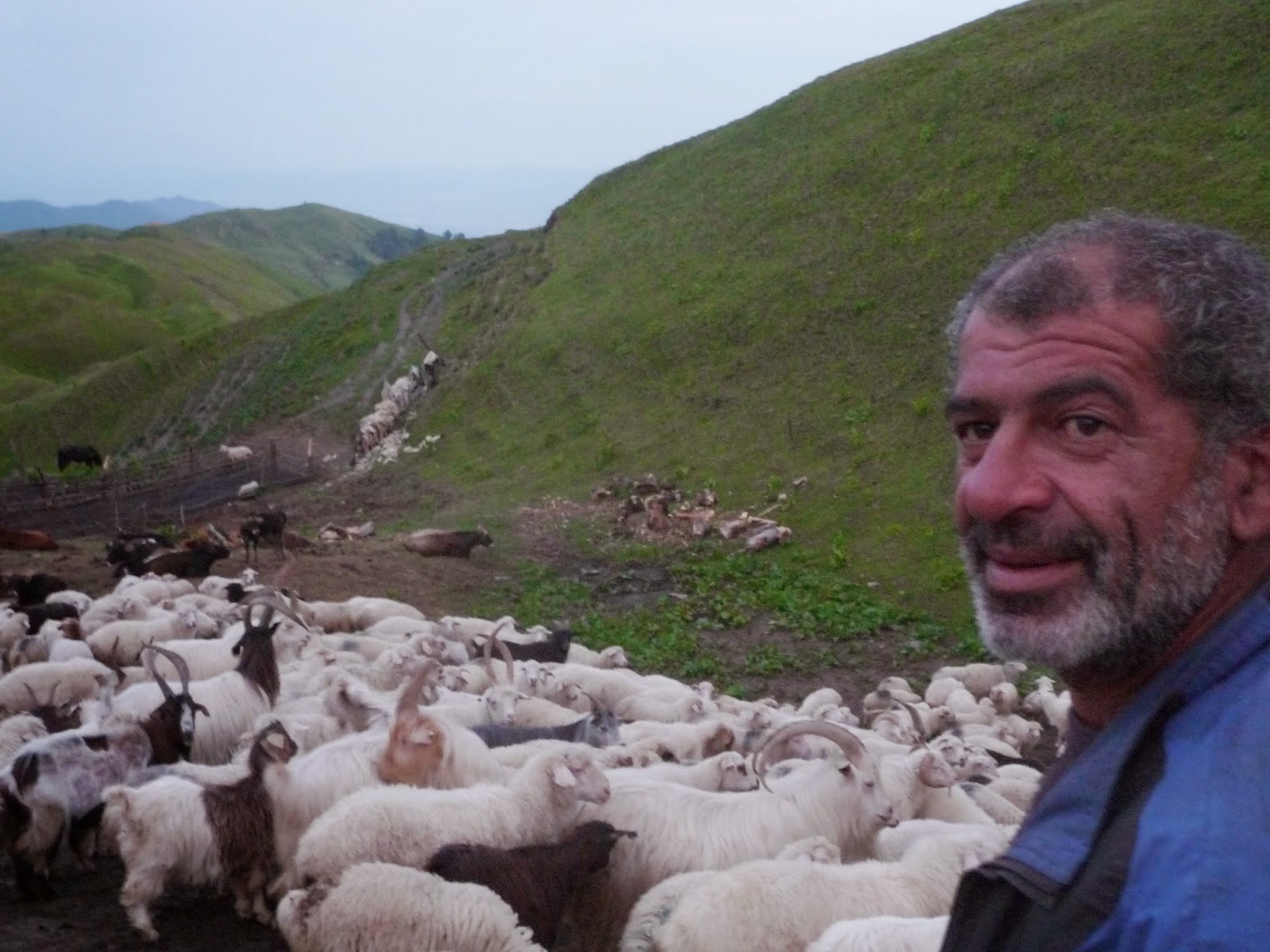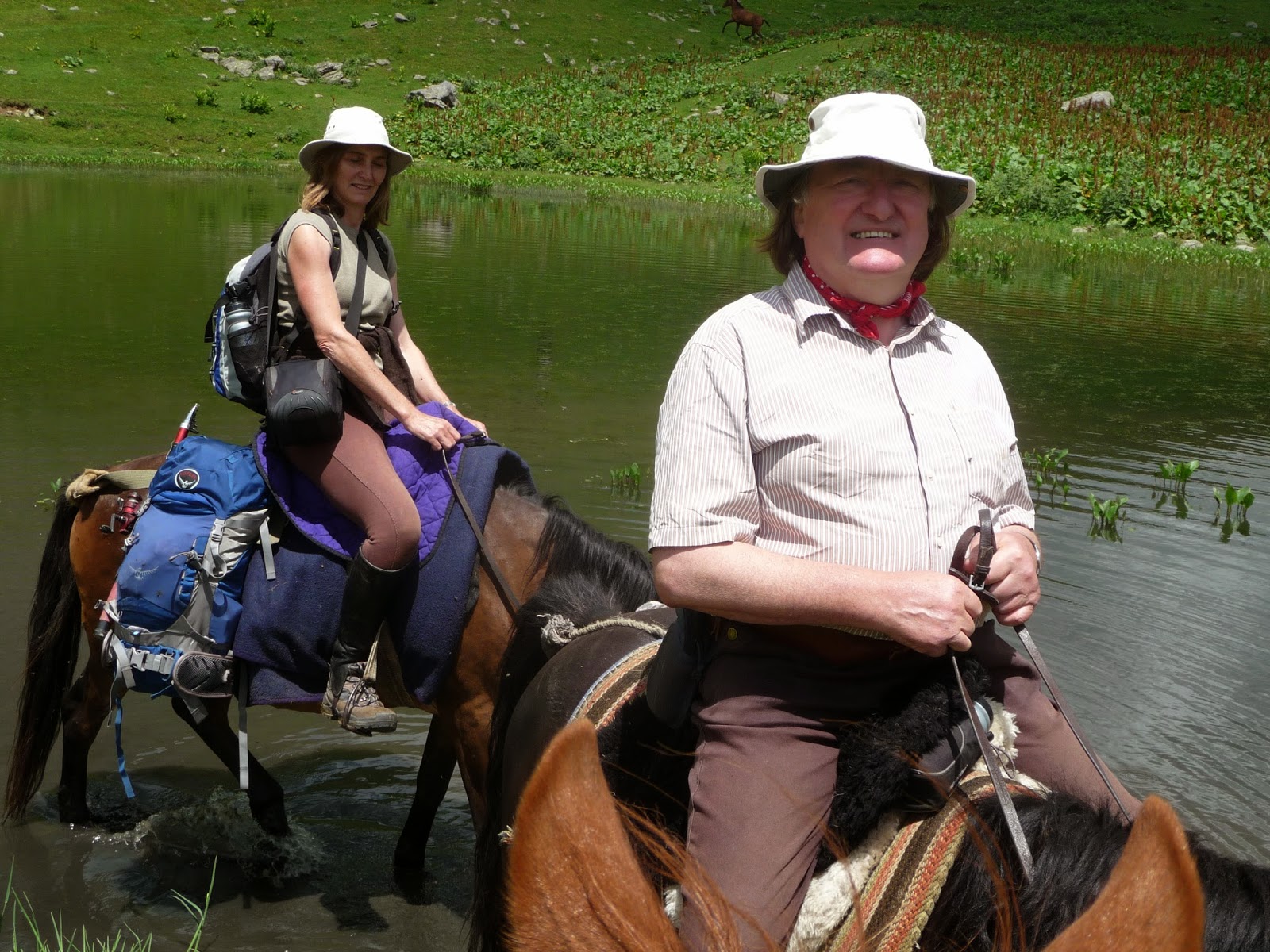Monday 30 June 2014
Discovering Pankisi. A brief introduction.
One of the joys about
exploring the world is you meet all kinds of kindred spirits. One of those
spirits is Gurjeet Batth who over the past few years has been discovering the
joys of Georgia, specifically the region of Pankisi. After many conversations while
comparing notes he persuaded my wife and I to take a trip to the Pankisi valley
and discover the region for ourselves.
This blog is about a
trip taken by my wife and I in June 2014 to the Pankisi valley, due south of
the Tusheti National park, on the doorstep of Akhmeta.
The Pankisi valley has
been largely forgotten by travelers due to some recent history when Chechen
refugees were coming over the border from Russia. The area was considered
turbulent and travellers were discouraged.
Time has since past, the region is now back to its sleepy self and
without a tradition of tourism. The only distinguishing feature of this region
is it is still inhabited by the Kist. The Kist, who are Sunni Muslims,
populated the area over three hundred years ago. What sets the Kist apart, is that many of the women practice Sufism
which I believe predates Islam but is still part of the Sunni traditional
thinking.
I hope this simple
introduction to Pankisi paints a compelling picture for you. To pull my story into focus,
scroll down and learn more about this hidden gem cradled in the Caucuses.
Labels:
Batsara reserve,
Chechen,
Jokolo,
Khinkali,
Kist,
Pankisi,
Pankisi Gorge,
Pankisi valley
Sunday 29 June 2014
Nazy's Guest House
Nazy's Guest House in Jokolo.
If
you have traveled and stayed in a Homestay (Bed & Breakfast) you will know
there are some real gems to be found in the world.
It is rare you will
find luxury like a Boutique Hotel but what you can find is something far more
exciting and closer to local life. Nazy’s Guesthouse was one of those genuine surprises.
A large and beautifully maintained house, Nazy lives with her Mother and Father
running an exceptionally clean and well turned out accommodation. The magic of
Nazy’s place was not the house, which is charming, but the food. Everything is
grown or reared by the family. The cows are milked, providing wonderful fresh
milk, yogurt and cheese. The chickens flourish and do their very best for your breakfast
and the kitchen garden provides a cornucopia of fresh produce. All of which is cooked
fresh or preserved and cherished by the visitors. The following pictures
illustrate Nazy’s Homestay, their garden and the village of Jokolo. Try this link for more http://nazysguesthouse.com/
Melissa and I keep a vegetable garden but this is something else.
A very happy looking frog. Always a good sign of an organic vegetable garden.
Neighbouring homes in Jokolo.
Jokolo church. Although the community are Muslim there is this very well preserved church in the village.
I just love these shops, packed to the brim with colourful goodies. Great bread and tins of sardines which are perfect for a picnic.
Nazy's father loading up hay for his dairy cows.
Some of the houses towards the mountains north of the village are very old indeed and still made in the traditional construction, similar to Tusheti. This is the exception but worth finding.
Life in Jokolo is slow and traditional scything hay and collecting in a hay-wain is still a regular occurrence and worth seeking out in season.
A few yards from Nazy's house are the meadows either side if the river where the cattle graze and local horses swish their tails keeping the odd fly at bay. You will find families of Geese strutting by and Turkeys looking for shade under the Walnut trees. Everything would be perfect but this is also a place villagers throw their debris. Not a great deal but this is a working community.
Labels:
Chechen,
Jokolo,
Khinkali,
Kist,
Pankisi,
Pankisi Gorge,
Pankisi valley
Saturday 28 June 2014
Shepherds and Cheese.
The idea behind
our trip to Pankisi was to take the opportunity and learn about sheep cheese
making in the region and using our guesthouse as a base, discover the many
local cultural delights. The following story illustrates our little journey
to fulfill a lifelong ambition and perhaps help folk understand more about this
rapidly vanishing world.
After our whirlwind
trip from Tbilisi we swiftly made our way to Jokolo by taxi and settled into
our welcoming Guest House. An airy place tucked down a side road close to the
river called Nazy’s Guest House. More of her and her family later. The
following morning we were introduced to Ramzan who was going to be our horseman
and guide in the mountains. Our quest was simple, ride into the mountains, stay
with some shepherds and photo document how cheese is made in the Caucuses
Alpine pastures. Why? Well Melissa and I had seen shepherds making cheese in
Romania and even stayed with Cow Herders in Hutsulshchyna in South Ukraine but
we had never been able to photo document Shepherds making sheep cheese on the
mountainside. You saw it here first. Try this link for cheese making
adventures in Southern Ukraine - Hutsulshchyna and don't ask me to
pronounce it.
http://hutsulshchyna.blogspot.co.uk/2011/09/wild-west.html
Once the cheeses have been drained they are put into plastic tubes where salt is sprinkled between each cheese. With the tube filled with cheeses they are sealed tightly and left to ferment.
An end to a magical trip and so easy to arrange with Nazy's help. You know you've got to do it!
Here's the Cheese market in Telavi where our shepherds hard work ends up.It's about 20 mins away by taxi. I just love markets and this one doesn't fail.
This was a new adventure for Ramzan and he rose to the occasion. Unlike Nazy, who speaks perfect English and I mean perfect, Ramzan speaks Russian, Chechen and possibly a few other languages but not English. Not that this ever mattered as he is a wonderful man who is testament a smile goes a very long way and Nazy was only a mobile phone call away. Yes you can get a signal everywhere, especially in the mountains.
Our ride was a slow day's ride which if you are fit you could walk. I had promised Melissa a wooden cabin but our man with the cabin no longer milked Sheep and Goats so we rode for another hour and found a father and son team of Azerbaijani shepherds. They were a bit surprised to see a middle aged English couple on horseback but my advice is on such occasions go equipped with a box of 200 cigarettes and a jar of coffee. You will be friends in a trice.
Shepherds in the Caucasus now invariably make their temporary home under plastic sheeting. This was quite a smart affair and clearly there for the summer.
A short walk from the tent is a glacial lake. A real treat for Melissa who got very excited about this rare mountain occurrence but not as excited as the frogs that night who sung a wonderful chorus all night long.
We arrived just as the curds had been separated from the whey and placed into muslin bags. The curds are then squeezed on a make shift draining board to remove as much whey as possible.
These shots were tricky to take due to the smoke from the fire but you get the atmosphere.
A very proud Shepherd who has over 500 goats and sheep to look after. 300 milkers all of which arrived at dusk. We were beginning to worry if the cheese we could see was from cows which is often the case. My wife is allergic to cow's milk hence the fascination and quest to find sheep cheese. This is now a very rare sight as it is much easier to tend a dairy herd than milk sheep and goats.
We slept with the cheeses in a cosy corner. Notice the rifle hanging up for when wolves get curious.
This lad took the sheep and goats up onto the mountainside. Notice his knapsack. I've only seen these in museums. The knapsack is made from a sheep's stomach and very special indeed if you like such things.
Just by the small lake is a spring and just perfect for a morning's shave and wash. I like the plastic bottle for a tap.
These sheep's ears fascinated me. They are cut off a sheep if it dies through an accident or natural causes. The Shepherd can then show the owner the ear and prove he has not sold the sheep. Not all of the flock are owned by the shepherd. Some are on loan for folk in the valley below. The owners take a cut of the cheese made.
Just before milking started two Kist lads arrived from the valley. This is tough work and it takes 5 man hours to milk 300 sheep and goats. The goat's milk gives the cheese a sweet flavour.
This bucket with bracken filled to the brim is used as a filter to catch the sheep's poo and other foreign bodies. Now you never knew that did you, well it was a first for me.
Once the milking had finished we saddled up. The idea was originally to stay longer but the ride up had been tough for the horses and I'm now very arthritic. We made our way down to Jokolo at a leisurely pace and Melissa walked.
Here's the Cheese market in Telavi where our shepherds hard work ends up.It's about 20 mins away by taxi. I just love markets and this one doesn't fail.
Labels:
Chechen,
Cheese,
Kist,
Pankisi,
Pankisi Gorge,
Pankisi valley,
Shepherds
Subscribe to:
Posts (Atom)



























































